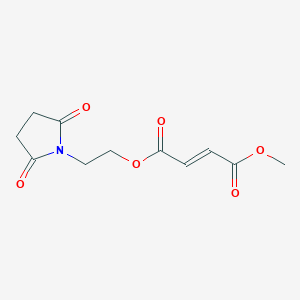Attribution Statement: LactMed is a registered trademark of the U.S. Department of Health and Human Services.
NCBI Bookshelf. A service of the National Library of Medicine, National Institutes of Health.
Drugs and Lactation Database (LactMed®) [Internet]. Bethesda (MD): National Institute of Child Health and Human Development; 2006-.
CASRN: 1577222-14-0

Drug Levels and Effects
Summary of Use during Lactation
No information is available on the clinical use of diroximel fumarate during breastfeeding. However, amounts of the active metabolite of diroximel fumarate, monomethyl fumarate, in breastmilk appear to be low and would not be expected to cause any adverse effects in breastfed infants. Based on clinical data in over 20 infants exposed to dimethyl fumarate in breastmilk, diroximel fumarate is acceptable to use during breastfeeding, at least after one month of age.[1] Breastfed infants should be monitored for adequate weight gain, and developmental milestones, especially in younger, exclusively breastfed infants. Some authors also recommend monitoring breastfed infants for flushing, vomiting and diarrhea.[2,3]
Drug Levels
Diroximel fumarate is not found in the plasma because it is rapidly converted to the active drug, monomethyl fumarate, which has a half-life of about 1 hour.
Maternal Levels. Two nursing mothers with relapsing-remitting multiple sclerosis began the closely related drug dimethyl fumarate 240 mg orally twice daily after discontinuing breastfeeding. They continued pumping milk and on day 8 of therapy, they each provided milk samples at 1, 2, 4, 8 and 12 hours after a dose. Peak monomethyl fumarate milk levels were 3.7 mcg/L in one mother and 11.2 mcg/L in the other and occurred at about 2 hours after the dose. Average milk levels were 2.7 mcg/L and 7.5 mcg/L, respectively. These values indicate that the infants would receive daily dosages of about 0.8 mcg/kg and 1.13 mcg/kg, respectively, or weight-adjusted relative infant dosages of 0.007% and 0.019% of the maternal dosage.[3]
Infant Levels. Relevant published information was not found as of the revision date.
Effects in Breastfed Infants
Twenty-six women taking dimethyl fumarate for relapsing-remitting multiple sclerosis were followed during 29 pregnancies from 2015 to 2020. Dimethyl fumarate was administered through week 24 of pregnancy and resumed 1 month after delivery. Twenty-two of 26 mothers breastfed (extent not stated) for 4 to 7 months. Infants were monitored up to the third year of life for infections and developmental disorders. All children were the 70th and 95th percentile for height and weight. The authors concluded that continuing dimethyl fumarate while breastfeeding is safe,[1] although infants were not exposed during the first month of life.
Effects on Lactation and Breastmilk
Relevant published information was not found as of the revision date.
Alternate Drugs to Consider
(Multiple Sclerosis) Glatiramer, Immune Globulin, Interferon Beta
References
- 1.
- Borriello G., Ianniello A. Efficacy, safety and tolerability of dimethylfumarate during pregnancy and breastfeeding. Mult Scler Relat Disord 2022;67:103949. [Abstract]. doi: 10.1016/j.msard.2022.103951. [CrossRef]
- 2.
- Almas S, Vance J, Baker T, et al. Management of multiple sclerosis in the breastfeeding mother. Mult Scler Int. 2016;2016:6527458. [PMC free article: PMC4757692] [PubMed: 26966579]
- 3.
- Ciplea AI, Datta P, Rewers-Felkins K, et al. Dimethyl fumarate transfer into human milk. Ther Adv Neurol Disord. 2020;13:1756286420968414. [PMC free article: PMC7607748] [PubMed: 33193814]
Substance Identification
Substance Name
Diroximel Fumarate
CAS Registry Number
1577222-14-0
Drug Class
Breast Feeding
Milk, Human
Dermatologic Agents
Immunosuppressive Agents
Radiation-Sensitizing Agents
Disclaimer: Information presented in this database is not meant as a substitute for professional judgment. You should consult your healthcare provider for breastfeeding advice related to your particular situation. The U.S. government does not warrant or assume any liability or responsibility for the accuracy or completeness of the information on this Site.
- User and Medical Advice Disclaimer
- Drugs and Lactation Database (LactMed) - Record Format
- LactMed - Database Creation and Peer Review Process
- Fact Sheet. Drugs and Lactation Database (LactMed)
- Drugs and Lactation Database (LactMed) - Glossary
- LactMed Selected References
- Drugs and Lactation Database (LactMed) - About Dietary Supplements
- Breastfeeding Links
- PMCPubMed Central citations
- PubChem SubstanceRelated PubChem Substances
- PubMedLinks to PubMed
- Review Dimethyl Fumarate.[Drugs and Lactation Database (...]Review Dimethyl Fumarate.. Drugs and Lactation Database (LactMed®). 2006
- Comparative pharmacokinetics and bioavailability of monomethyl fumarate following a single oral dose of Bafiertam® (monomethyl fumarate) versus Vumerity® (diroximel fumarate).[Mult Scler Relat Disord. 2023]Comparative pharmacokinetics and bioavailability of monomethyl fumarate following a single oral dose of Bafiertam® (monomethyl fumarate) versus Vumerity® (diroximel fumarate).Rousseau FS, Wang L, Sprague TN, Lategan TW, Berkovich RR. Mult Scler Relat Disord. 2023 Feb; 70:104500. Epub 2023 Jan 3.
- Diroximel fumarate in the treatment of multiple sclerosis.[Neurodegener Dis Manag. 2020]Diroximel fumarate in the treatment of multiple sclerosis.Jonasson E, Sejbaek T. Neurodegener Dis Manag. 2020 Oct; 10(5):267-276. Epub 2020 Jul 20.
- Persistence, Adherence, and Switching to Higher-Cost Therapy in Patients with Multiple Sclerosis Initiating Oral Disease-Modifying Therapies: A Retrospective Real-World Study.[Neurol Ther. 2022]Persistence, Adherence, and Switching to Higher-Cost Therapy in Patients with Multiple Sclerosis Initiating Oral Disease-Modifying Therapies: A Retrospective Real-World Study.Araujo L, Geertsen SS, Amedume A, Higuchi K, van Wingerden J. Neurol Ther. 2022 Dec; 11(4):1735-1748. Epub 2022 Sep 24.
- Review Diroximel Fumarate in Relapsing Forms of Multiple Sclerosis: A Profile of Its Use.[CNS Drugs. 2021]Review Diroximel Fumarate in Relapsing Forms of Multiple Sclerosis: A Profile of Its Use.Paik J. CNS Drugs. 2021 Jun; 35(6):691-700. Epub 2021 May 31.
- Diroximel Fumarate - Drugs and Lactation Database (LactMed®)Diroximel Fumarate - Drugs and Lactation Database (LactMed®)
Your browsing activity is empty.
Activity recording is turned off.
See more...
